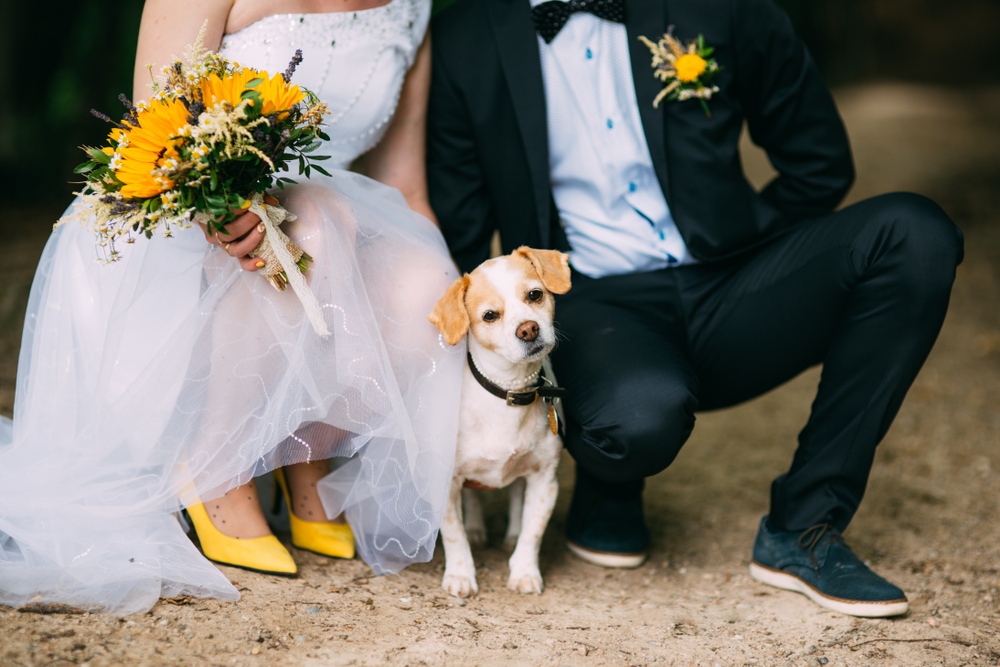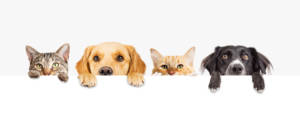
Many of us share our homes and hearts with four-legged companions. The Canadian Animal Health Institute reports that around 58% of the nation’s households have dogs or cats. Felines slightly outnumber canines, with 8.1 million cats versus 7.7 million dogs. If you’re like many engaged couples, you want to include Max or Fifi in your wedding day. With a few health and safety tips, your furry companion can enjoy the festivities along with you.
Food and Beverage Safety Tips
Maybe you’re fortunate to have a well-behaved companion that doesn’t beg. Or your furry bestie steals food off your plate at every opportunity. Either way, food safety is important when it comes to your pets. You’ll have loads of delicious delicacies for your guests, but some can make your pet severely ill. The Canadian Veterinary Medical Association lists several common risky foods:
- Chocolate, tea, and coffee
- Alcohol
- Grape-derived foods
- Onions, garlic, chives, and leeks
- Macadamia nuts
- Salty foods
- Raw bones, meat, and seafood
Many of these are toxic even in small quantities, thanks to your pet’s smaller size and body weight. Some, such as onions and garlic, contain compounds that can cause serious illness. Raw animal products may harbor bacteria and parasites. And as for bones, they can break into smaller pieces that can cut soft tissue. The Humane Society of the United States list many more harmful foods and beverages.
You don’t have to redesign your entire menu to ensure your companions’ safety. Quite frankly, it’s an impossible effort. Inform your guests that they should not slip Fido or Fluffy any table scraps. PetMD suggests asking a trusted friend to keep an eye on your pets – just in case their sad-eyed looks get the best of someone. Alternatively, you may want to have someone take your furry friends home after the ceremony.
Flowers and Green Décor
Just as some foods can make your pet sick, so can many ornamental plants. Popular wedding flowers such as lilies, gardenias, dahlias, and hydrangeas can literally poison your cat or dog. Toxic plants also include non-flowering greenery like laurel, eucalyptus, and palm leaves. Your pets may not chomp on your bouquets or boutonnieres, but curiosity could lead them to munch on centerpieces, altar arrangements, and other décor.
So what’s a couple to do? PetMD offers a simple solution: Choose nontoxic varieties. Working with your florist can help you figure out which ones to avoid. The ASPCA provides an exhaustive database with hundreds of entries on flowers, green plants, nuts, and produce.
Door-Dashing Dogs and Cantankerous Cats
Animals can be unpredictable, even if they’re your lifelong friends and you know them inside out. The cacophony of wedding day sights, smells, and sounds can excite or overwhelm your pet. The last thing you want is Spot crashing headfirst into a glass door or Luna cowering and hissing in a corner. Should your pet cause injuries to guests or vendor staff, you’ll be held liable.
Preventing pet-related catastrophes requires a few smart steps. Hire a pet sitter for the day, suggests Wedding Ideas’ Lottie Dainton. Not only will your furry friends be taken care of, but your sitter will also see to their safety and well-being. Dogs should be leashed trained, and if possible, consider leash training cats as well. Cat behavior expert Jackson Galaxy recommends clicker training to ease your feline friend into the practice.
Minding Your Four-Legged Guests
Your wedding is a monumental event, so it’s natural that you want to include your pet. Being mindful of your friend’s safety and needs is key. Keeping pets away from people food and choosing nontoxic plant décor can avoid food poisoning. A trusted friend or sitter can also ensure your four-legged bestie is taken care of. With these safety measures, your pet can stay healthy and happy on your big day.



